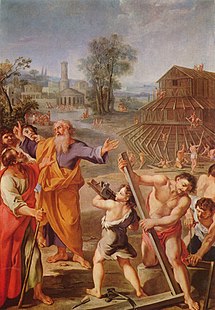Marcheshvan (Hebrew: מַרְחֶשְׁוָן, Standard Marḥešvan, Tiberian Marḥešwān; from Akkadian waraḫsamnu, literally, 'eighth month'), sometimes shortened to Cheshvan (חֶשְׁוָן, Standard Ḥešvan Tiberian Ḥešwān), is the second month of the civil year (which starts on 1 Tishrei), and the eighth month of the ecclesiastical year (which starts on 1 Nisan) on the Hebrew calendar.
| Cheshvan | |
|---|---|

The Great Flood, which according to the Bible wiped out the world, started in Marcheshvan.
| |
| Native name | מַרְחֶשְׁוָן (Hebrew) |
| Calendar | Hebrew calendar |
| Month number | 8 |
| Number of days | 29 or 30 |
| Season | Autumn (Northern Hemisphere) |
| Gregorian equivalent | October–November |
← Tishrei
Kislev →
| |
In a regular (kesidran) year, Marcheshvan has 29 days, but because of the Rosh Hashanah postponement rules, in some years, an additional day is added to Marcheshvan to make the year a "full" (maleh) year. Marcheshvan occurs in October–November in the Gregorian calendar.
The Hebrew Bible, before the Babylonian Exile, refers to the month as Bul (1 Kings 6:38). In Sidon, the reference to Bul is also made on the Sarcophagus of Eshmunazar II dated to the early 5th century BC.
Compared to its Akkadian etymon waraḫsamnu, the name Marḥešvan displays the same lenition of ungeminated מ /m/toו /v/ found in other month names (Tammuz traditionally contains mem with dagesh). Uniquely to this name the initial ו has also changed to מ, giving the overall effect of a metathesis. In the modern form, with the connection to the roots w-r-ḥ ('moon', 'month') and š-m-n ('eight') no longer apparent, the first two letters מַר (mar) have been re-interpreted as the Hebrew word for 'bitter', alluding to the fact that the month has no holidays or fasts.[1] In other contexts, the word מַר is attributed to mean droplet,[2] associating this month with the rainy season.